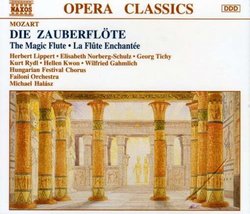| All Artists: Peter Koves, Wolfgang Amadeus Mozart, Michael Halasz, Failoni Chamber Orchestra (Budapest), Failoni Orchestra, Elizabeth Norberg-Schulz, Hellen Kwon, Lotte Leitner, Herbert Lippert, Peter Jelosits, Wilfried Gahmlich, Anna Gonda, Georg Tichy, Julie Faulkner, Maximilian Richter, Robert Holzer, Robert Pap, Waltraud Winsauer Title: Mozart: Die Zauberflöte Members Wishing: 0 Total Copies: 0 Label: Naxos Original Release Date: 1/1/1994 Re-Release Date: 6/28/1994 Genre: Classical Styles: Opera & Classical Vocal, Historical Periods, Classical (c.1770-1830), Modern, 20th, & 21st Century Number of Discs: 2 SwapaCD Credits: 2 UPC: 730099603027 |
Search - Peter Koves, Wolfgang Amadeus Mozart, Michael Halasz :: Mozart: Die Zauberflöte
 | Peter Koves, Wolfgang Amadeus Mozart, Michael Halasz Mozart: Die Zauberflöte Genre: Classical
|
Larger Image |
CD Details |
CD ReviewsA remarkable achievement and a great bargain! 05/23/2001 (5 out of 5 stars) "Mozart's singspiel, The Magic Flute, includes some of the most sublime music ever composed. I have heard (and own!) several different recordings of this masterwork, such as the classic versions by Boehm and Klemperer, and a newer version by Solti. As a diehard classical CD hunter, I approached this Naxos offering with caution and purchased a used copy from a local record store. I was swept off my feet when I listened to this recording...it is terrific! With the exception of Kurt Rydl, I was completely unfamilar with the cast but they, and the Failoni Orchestera under Michael Halasz, have achieved something quite marvelous here. From a performance standpoint, it ranks with many of the best recordings made. From a recording perspective, the orchestra occasionally competes with the singers (for example, in "Bald prangt, den Morgen zu verkuenden") and the orchestral bass is at times a little boomy, but these are minor criticisms considering the overall quality of the performance. This pair of CDs is worth many times their modest asking price and would be a great addition to the collections of anyone wanting a great Mozart recording." Excellent rendition of the Magic Flute Language Learner | FL, USA | 09/01/2001 (5 out of 5 stars) "This Naxos double CD is excellent and the price is very reasonable. It contains a libretto in German. The sound quality is good, the dialog is clear, and the music is very good. Excellent performances by Lippert as Tamino, Norberg-Schulz as Pamina, Rydl as Sarastro, and Gahmlich as Monostatos. Georg Tichy's rendition of Papageno was enjoyable, and so was Kwon's rendition of the Queen of the Night. The singing of the three boys was also very well done. I am very glad I purchased this Naxos CD." Pleasing to the heart and soul! Tenorific | MO | 07/26/2005 (4 out of 5 stars) "I recently bought this recording of Die Zauberflote and it is a wonderful recording. All of the characters are vocally well-matched. I really enjoyed hearing the ensembles on this disc, especially the Three Women and the Three Boys. I was pleased to hear actaull boys singing the "Three Boys" passages. Usually, women do a trouser role there. I only have two suggestions. The Queen of the Night is a very difficult character to portray vocally, so I understand that it can be challenging to find someone who does it extremely well. Hellen Kwon was great but her extreme high notes were very "throaty," when they should be birdlike(not screechy though!). Despite this, every emotion of this character could be heard through Kwon's beautiful voice.
My next suggestion is more of a preference. Tichy does a wonderful job portraying the comic Papageno. I, however, prefer that Papageno be performed by a lyric baritone. Tichy sounded like more of a bass-baritone with a dark tone. Overall this is a great recording. I recommend this collection to any opera lover or non-lover." |

 Track Listings (23) - Disc #1
Track Listings (23) - Disc #1